高中英语必修五总结
高二年级必修五英语知识点总结优秀4篇
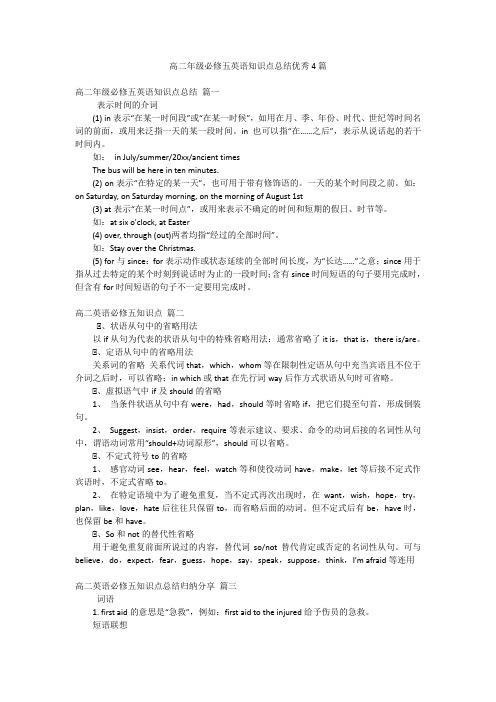
高二年级必修五英语知识点总结优秀4篇高二年级必修五英语知识点总结篇一表示时间的介词(1) in表示“在某一时间段”或“在某一时候”,如用在月、季、年份、时代、世纪等时间名词的前面,或用来泛指一天的某一段时间。
in也可以指“在……之后”,表示从说话起的若干时间内。
如:in July/summer/20xx/ancient timesThe bus will be here in ten minutes.(2) on表示“在特定的某一天”,也可用于带有修饰语的。
一天的某个时间段之前。
如:on Saturday, on Saturday morning, on the morning of August 1st(3) at表示“在某一时间点”,或用来表示不确定的时间和短期的假日、时节等。
如:at six o'clock, at Easter(4) over, through (out)两者均指“经过的全部时间”。
如:Stay over the Christmas.(5) for与since:for表示动作或状态延续的全部时间长度,为“长达……”之意;since用于指从过去特定的某个时刻到说话时为止的一段时间;含有since时间短语的句子要用完成时,但含有for时间短语的句子不一定要用完成时。
高二英语必修五知识点篇二Ⅰ、状语从句中的省略用法以if从句为代表的状语从句中的特殊省略用法:通常省略了it is,that is,there is/are。
Ⅰ、定语从句中的省略用法关系词的省略关系代词that,which,whom等在限制性定语从句中充当宾语且不位于介词之后时,可以省略;in which或that在先行词way后作方式状语从句时可省略。
Ⅰ、虚拟语气中if及should的省略1、当条件状语从句中有were,had,should等时省略if,把它们提至句首,形成倒装句。
2、Suggest,insist,order,require等表示建议、要求、命令的动词后接的名词性从句中,谓语动词常用“should+动词原形”,should可以省略。
(完整word版)人教版新课标高中英语必修五知识点总结.doc

(完整word版)人教版新课标高中英语必修五知识点总结.doc1.scientist science scientific2.know about 了解know of听3.find/ find out/ discover/ invent4.explain sth. to sb5.be characteristic of sb/ sth6.pass sth from?从?来 , 下pass by路,?pass down把?下去pass on, 授7.the way of doing sth = the way to do做某事的方法8.put forward 提出建,推荐某人或者自己任,提名;往前9.by the way 便by way of?通?的方法lose one’ s way迷路no way 没,想feel one ’s way 摸索着走慎从事on one’ s way to?在去??的路上in this way=by this means=with this method 用种方法10. put away抛弃;舍弃put down 写下来 ; 入名put on穿上;戴上;增加put off耽;延期put out熄(灯);扑(火 )put up建立;建造put up with ?忍受?11.arrive at / come to / draw/ reach a conclusion12.win / beat /defeatwin “ 得, ” , 后接品 , 金 , 名誉 ,beat “ , ” , 后接争伍或者手, 人defeat “ ,” , 后接争伍或者手 , 人 , (此用法同 beat), 疾病等。
13.be expert at/in sth 某方面的家14.attend 注意;照看,照;参加attendance n. 照 , 出席attend school上学attend a lecture听座attend a wedding出席婚礼15. attend to理 , 理 I have some important things to attend to.照 , 照料 ; Are you being attended to ? 先生 , 有人接待你?心 , 注意If you don ’t attend to the teacher, you ’ ll never learn anything.16. expose A to B使A暴露于 BA be exposed toB A 暴露于 B17. die (v.)dead (adj.)death (n.)deadly adj. 致命的18. deadly adv.(1)very 极度 ; 非常 ; 十分deadly serious十分真(2)like death死一般地deadly pale 死一般白19.every time 每当每次(接句子)注意: immediately, the moment, directly,instantly等与every time 一 , 都可以用作引状从句, 意“一? ..就”。
高中英语必修5知识点总结

高中英语必修5知识点总结高中英语必修5知识点Unit 1:1. put forward: 提出(计划、建议等);将…提前;把钟表拨快e.g. He put forward a good plan for this project. 他为这项工程提出了一个好的方案。
The match has been put forward to 1:30. 比赛已经提前到一点半举行。
Put the clock forward by ten minutes. 把钟表拨快十分钟。
词语联想put away: 收起来;贮存,储蓄put down: 放下;写下,记下put off: 推迟;延期put on: 穿上;增加;上演(戏剧)e.g. put on weight: 增加了体重 put on a new play: 上演新戏剧put up: 张贴;撑开(帐篷)e.g. put up a poster put up a tent: 搭起帐篷2. conclude: v. 作结论,断定(conclusion: n. 结论)e.g. The jury concluded that he was guilty. 陪审团认定他有罪。
习惯用语 draw a conclusion 作出结论3. defeat vt.打败, 击败, 战胜; 使(希望, 计划等)失败, 挫败; 阻挠, 使无效e.g. He finally conceded defeat. 他最终承认了失败。
◆ 区别: defeat, conquer, overcomedefeat 指“赢得胜利”, 尤其指“军事上的胜利”,e.g. defeat the enemy 打败敌人。
conquer指“征服”、”战胜”,特别指“获得对人、物或感情的控制”,e.g. conquer natureovercome指“战胜”、“压倒”、“克服”尤指“感情”而言, e.g. overcome difficulties4. attend: v.1) to be present at; go to (meeting, conference, lecture...) 出席;参加e.g. He decided to attend the meeting himself. 他决定亲自赴会。
高中英语必修五知识点总结归纳

高中英语必修五知识点总结归纳高中英语必修五知识点总结归纳高中英语必修五是高中英语课程中的重要组成部分,涵盖了重要的语法、词汇和阅读技巧等方面。
今天,我们就来总结一下必修五中的知识点,希望能为大家复习英语课程提供帮助。
一、语法知识点1.动词时态动词时态在英语中是一个重要的语法方面。
在必修五课程中,重点涉及了过去时、现在完成时、过去完成时和将来时等时态。
在使用时态时,一定要注意时间的连贯性和准确性。
2.从句从句是一个包含一个主语和谓语的句子,它是从句主句的一部分。
在必修五中,我们主要学习了定语从句、状语从句和名词性从句等。
在使用从句时,一定要注意从属关系、语序和关联词的使用。
3.几种独立结构在高中英语中,我们需要学习独立结构,这样可以使我们的语言更加丰富多彩。
在必修五中,我们主要学习了不定式、分词和动名词。
在使用独立结构时,一定要注意语义的准确性和句子结构的完整性。
二、词汇知识点1.词根、词缀和词源在英语中,词根、词缀和词源是重要的词汇构成要素。
在必修五中,我们需要学习常见的词根、词缀和词源,这些知识点有助于我们更好地理解单词。
例如,learn和teach都有相同的词根“-lec-”,这意味着它们有着相似的意义和用法。
2.常见专业词汇在必修五中,我们需要学习许多专业词汇,包括数学、物理、化学、生物、地理、历史和政治等。
这些词汇是我们学习和掌握专业知识的基础。
在学习专业词汇时,要注意其用法和拼写,这样可以有效提高我们的词汇量和语言表达能力。
三、阅读技巧1.阅读理解在高中英语中,阅读理解是一个重要的方面。
在必修五中,我们需要学习如何快速和准确地理解英文文章。
为此,我们需要掌握一些阅读技巧,例如读完整文、理解段落结构、通过上下文判断单词含义等。
2.阅读速度除了理解文章之外,我们还需要通过提高阅读速度来更好地学习英语。
在高中英语必修五中,我们可以通过多读英文文章、练习速读技巧和扩大阅读量等方式来提高阅读速度。
必修五英语知识点总结

必修五英语知识点总结在必修五英语课程中,我们学习了许多重要的英语知识点,包括语法、词汇、阅读技巧、写作技巧以及口语表达等。
这些知识点都对我们提高英语水平起着至关重要的作用。
下面将对必修五英语知识点进行总结。
1. 语法知识点- 名词:名词是指人、动物、物体、地方、事物等的名称。
在句子中,名词通常作为主语、宾语、表语或定语等主要成分出现。
名词的单数和复数形式、不可数名词、所有格等是我们学习名词的重点内容。
- 代词:代词是用来代替名词的词语,例如人称代词、物主代词、反身代词、指示代词、疑问代词等。
了解代词的用法和不同形式对于我们的口语表达和写作都非常重要。
- 动词:动词是表示人或事物的行为或状态的词语,包括情态动词、动词时态和语态、动词的不定式和分词等。
正确使用动词可以帮助我们表达清晰、准确的语言。
- 形容词和副词:形容词用来修饰名词,副词用来修饰动词、形容词和其他副词。
了解形容词和副词的比较级和最高级形式以及用法对于我们的语言表达非常重要。
2. 词汇知识点- 同义词和反义词:同义词是指意思相同或相近的词语,反义词是指意思相反的词语。
学习同义词和反义词可以帮助我们扩充词汇量,并丰富我们的语言表达。
- 词根词缀:词根是词语的核心部分,词缀是加在词根上起到构词作用的字母。
了解词根词缀可以帮助我们推断词语的含义,丰富我们的词汇知识。
- 固定搭配和习惯用语:固定搭配和习惯用语是在语言中习惯性使用的词语组合,掌握这些固定搭配和习惯用语可以帮助我们更自然地使用英语表达自己的意思。
3. 阅读技巧- 阅读理解:阅读理解是我们学习英语中非常重要的一个技能,包括概括大意、寻找关键信息、推断词义、阅读速度和理解深度等方面。
通过不断阅读各种类型的英语文章,我们可以提高自己的阅读理解能力。
- 阅读策略:阅读策略是指我们在阅读过程中采取的一些技巧和方法,例如预测内容、扫读和略读、注意段落结构和标点符号等。
掌握这些阅读策略可以帮助我们更高效地阅读和理解文章。
高中英语必修五知识点总结

高中英语必修五知识点总结高中英语必修五是高中阶段的重要课程,也是备战高考的重要一步。
学习必修五,掌握重要的知识点是非常重要的,下面就分别介绍一下必修五的重要知识点。
一、词汇1.词根词缀必修五中,有很多的词汇是由词根词缀组成的。
一些常见的英文前缀有:un-, dis-, mis-, in-等,后缀有:-ance/ -ence,-ment, -ful等。
通过学习词根词缀,可以拓展词汇量,更好地掌握词义,提高写作和阅读的能力。
2.同义词必修五中,相似词义的词汇比较多,学会掌握同义词可以更好地理解和运用课文中的词汇。
3.词汇搭配英语中的词汇搭配也很重要。
通过掌握相应的用法和搭配,可以提高表达能力,避免在写作时出现语言不通顺的情况。
二、语法1.时态时态是英语语法中比较重要的一部分。
在学习必修五中,时态的掌握是非常重要的。
学会时态,可以避免在口语和写作中出现不合理的语法错误。
2.虚拟语气虚拟语气是英语中一个比较难掌握的部分,但也是必修五中必须要重点掌握的。
虚拟语气是英文中表达一种虚构或假设的语气,通常出现在条件句、愿望句和建议句中。
3.倒装倒装是英语语法中的一种规则,必修五中也有一些文章使用了倒装句。
掌握倒装的知识可以帮助同学们更好地理解句子意思,并能在写作时更恰当地运用倒装句法结构。
三、阅读1.推理题阅读理解中,推理题是比较考验学生阅读能力的一种题型。
要想在这方面有所突破,建议在阅读课文时学会挖掘信息,培养推理思维能力。
2.词汇理解在阅读课文时,词汇的理解是非常重要的。
学生要学会利用上下文信息推断词汇含义,掌握常见的词汇搭配,养成自己独立思考的习惯。
3.主旨大意主旨大意题是阅读理解中比较重要的一种题型。
阅读课文时,要学会筛选文章的主干内容,掌握文章大意,为后续的解题提供概括的思路和方向。
四、写作1.文体英语写作中,有许多不同的文体。
在学习必修五中,要学会辨认并掌握不同文体的特点。
这将有助于同学们在写作时更好地进行思路构架和文章结构安排。
高中英语必修五知识点整理

高中英语必修五知识点整理grammar一、过去分词过去分词兼有动词、副词和形容词的特征,可以带宾语或受状语修饰。
过去分词和宾语或状语一起构成过去分词短语。
它在句中可以作定语、表语、宾语补足语或状语。
这节课讲解作定语、表语的用法。
1. 作定语作定语的过去分词假如是单词,一般放在被修饰词的前面;过去分词短语作定语,一般放在被修饰词的后面。
例如:there are many fallen leaves on the ground.this is a book written by a worker.2. 作表语过去分词作表语,多表示主语所处的状态。
i was pleased at the news.the door remained locked.过去分词作表语,相当于形容词,常见的有:delighted, disappointed, astonished, interested, satisfied, surprised, tired, worried, excited, married 等。
过去分词作表语时,应留意与被动结构的区分。
系表结构说明主语的状态或具有的性质、特点;被动结构强调谓语动作。
the small village is surrounded by trees.(状态)the small village was soon surrounded by enemy soldiers.(动作)i'm interested in chess.(状态)3. 过去分词做状语①表时间,相当于一个时间状语从句,有时过去分词前可加连词 when 或while 来强调时间概念。
seen from the top of the hill, the city looked like a big garden. accepted by the party, he decided to devote his life to the cause of the party.②表缘由,相当于一个缘由状语从句。
高二英语必修五 高二年级英语必修五知识点总结(优秀7篇)

高二英语必修五高二年级英语必修五知识点总结(优秀7篇)高二英语必修五知识点复习篇一creative adj.有创造力的。
co-operative adj.合作的positive adj.积极的(be) strict with...对……严格的Nicolas Copernicus尼古拉。
哥白尼revolutionary adj.革命的movement n.移动make sense讲得通backward adj.向后的loop n.圈privately adv.私下的spin v.(使)旋转brightness n.明亮enthusiastic adj.热情的cautious adj.小心的reject v.拒绝高二英语必修五知识点归纳篇二句子成分的省略为了避免重复,或者为了使某一内容引人注目,可以省略某些句子成分而保持句子原意不变。
1.省略主语Beg your pardon.请你原谅。
(= I beg your pardon.))Serves you right. 你活该(= It serves you right.)2.省略谓语Anything the matter? 要紧吗?(= Is anything the matter?)The river was deep and the ice thin. 河很深,冰很薄。
(= The river was deep and the ice was thin.)3.省略表语Are you ready? Yes,I am.(am 后面省略了表语ready)4.省略宾语We have to analyze and solve problems. (analyze 后省略了宾语problems)Let's do the dishes. I'll wash and you'll dry.(wash 和dry 后面省略了宾语dishes)5.省略定语He spent part of the money, and the rest he saved.(the rest 后面省略了定语of the money)6.省略状语(Even)The wisest man cannot know everything.高二年级英语必修五知识点整理篇三动词不定式作宾语以不定式结构为宾语的动词有:ask, agree, care, choose, demand, decide, expect, fail, help, hope, learn, manage, offer, plan,prepare, pretend, promise, refuse, want, wish等只能用动词不定式作宾语口诀(接不定式作宾语的动词)想要学习早打算( want learn plan)快准备有希望( prepare hope wish expect)同意否供选择(agree offer choose)决定了已答应(decide be determined promise)尽力去着手做(manage undertake)别拒绝别假装(refuse pretend)失败不是属于你(fail)e.g.Tom refused to lend me his pen.We hope to get there before dark.The girl decided to do it herself.高二英语必修五知识点归纳笔记篇四1. Whichever and whatever you like, there is a theme park for you!2. With all these attractions, no wonder tourism is increasing wherever there is a Disneyland.3. To enter a world of fantasy about ancient England, come to Camelot Park!4. Futuroscope is not only for individuals, but is also the perfect mix of fun and learning for class outings.5. If driving, Futuroscope is within easy reach of the freeway.6. Visit the candy shop to try the same kind of candy that American southerners made 150years ago, or take a ride on the only steam engine train still working in the7. After that, joined some drivers and went to the bottom of the ocean to see the strange blind creatures that have never seen sunlight.Visitors can get close to parts of the world they have never experienced, going to the bottom of the ocean, flying through the jungle or visiting the edges of the solar system高二英语必修五知识点归纳篇五1、at如:常用词组有:at noon, at night表示时间的at, in, on:表示片刻的时间,at 8 o’clock,at midnight, at the end of, at that time, at the beginning of, at the age of, at Christmas, at New Year 等。
必修5英语知识点总结
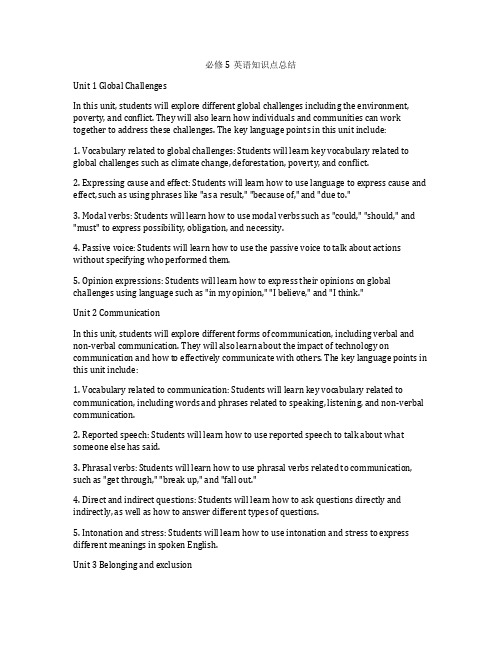
必修5英语知识点总结Unit 1 Global ChallengesIn this unit, students will explore different global challenges including the environment, poverty, and conflict. They will also learn how individuals and communities can work together to address these challenges. The key language points in this unit include:1. Vocabulary related to global challenges: Students will learn key vocabulary related to global challenges such as climate change, deforestation, poverty, and conflict.2. Expressing cause and effect: Students will learn how to use language to express cause and effect, such as using phrases like "as a result," "because of," and "due to."3. Modal verbs: Students will learn how to use modal verbs such as "could," "should," and "must" to express possibility, obligation, and necessity.4. Passive voice: Students will learn how to use the passive voice to talk about actions without specifying who performed them.5. Opinion expressions: Students will learn how to express their opinions on global challenges using language such as "in my opinion," "I believe," and "I think."Unit 2 CommunicationIn this unit, students will explore different forms of communication, including verbal and non-verbal communication. They will also learn about the impact of technology on communication and how to effectively communicate with others. The key language points in this unit include:1. Vocabulary related to communication: Students will learn key vocabulary related to communication, including words and phrases related to speaking, listening, and non-verbal communication.2. Reported speech: Students will learn how to use reported speech to talk about what someone else has said.3. Phrasal verbs: Students will learn how to use phrasal verbs related to communication, such as "get through," "break up," and "fall out."4. Direct and indirect questions: Students will learn how to ask questions directly and indirectly, as well as how to answer different types of questions.5. Intonation and stress: Students will learn how to use intonation and stress to express different meanings in spoken English.Unit 3 Belonging and exclusionIn this unit, students will explore the concepts of belonging and exclusion in relation to identity, culture, and social groups. They will learn about different forms of discrimination and how to promote inclusivity and diversity. The key language points in this unit include:1. Vocabulary related to belonging and exclusion: Students will learn key vocabulary related to identity, culture, discrimination, and diversity.2. Conditional sentences: Students will learn how to use conditional sentences to talk about hypothetical situations, including the first, second, and third conditional.3. Comparatives and superlatives: Students will learn how to use comparatives and superlatives to compare different people, things, and ideas.4. Indirect speech acts: Students will learn how to interpret and use indirect speech acts, such as requests and offers.5. Idioms and expressions: Students will learn common idioms and expressions related to belonging and exclusion, as well as how to use them in context.Unit 4 Cultural identityIn this unit, students will explore the concept of cultural identity and how it shapes individuals and societies. They will learn about different cultural practices, traditions, and customs, as well as how to respect and appreciate cultural diversity. The key language points in this unit include:1. Vocabulary related to cultural identity: Students will learn key vocabulary related to culture, traditions, customs, and cultural diversity.2. Relative clauses: Students will learn how to use relative clauses to give additional information about a noun, as well as how to reduce and omit relative pronouns.3. Discourse markers: Students will learn how to use discourse markers to link ideas and express relationships between different parts of a text or conversation.4. Reported questions: Students will learn how to use reported speech to talk about questions that have been asked.5. Collocations and word formation: Students will learn how to use collocations and word formation to expand their vocabulary and express themselves more accurately and fluently. Unit 5 Human ingenuityIn this unit, students will explore human ingenuity and innovation, including scientific discoveries, technological advancements, and creative achievements. They will also learn about the impact of human ingenuity on society and the environment. The key language points in this unit include:1. Vocabulary related to human ingenuity: Students will learn key vocabulary related to innovation, creativity, scientific discoveries, and technological advancements.2. Passive voice with reporting verbs: Students will learn how to use the passive voice with reporting verbs to talk about who or what made a statement, suggestion, or order.3. Gerunds and infinitives: Students will learn how to use gerunds and infinitives as subjects, objects, and complements in sentences.4. Modal verbs for deduction: Students will learn how to use modal verbs for deduction, including "must," "can't," "may," and "could."5. Extended speaking: Students will learn how to engage in extended speaking activities, such as giving presentations, discussing ideas, and participating in formal discussions. Overall, the key language points in these units include vocabulary related to global challenges, communication, belonging and exclusion, cultural identity, human ingenuity, as well as grammar points such as modal verbs, passive voice, reported speech, conditionals, and discourse markers. Additionally, students will learn about how to express opinions, ask questions, use phrasal verbs, and engage in extended speaking activities. By mastering these language points, students will be better equipped to express themselves accurately and fluently, as well as to engage in meaningful discussions and communicate effectively with others.。
高中英语必修五整本书总结

必修5 Unit 11.Put短语break短语参考短语页子2.总之To conclude=In conclusione to/reach/draw/arrive at a conclusion4.沾染上be infected with5.打败defeat sb经历几次失败after several defeats6.一个专家an expert in某方面有经验be expert in7.照顾某人attend (to) sb 出席attend ameeting/wedding/lecture/funeral8.使暴露于expose sth to sth; 使某人接触exposesb to sth; 向某人揭发expose sth to sb9.治愈…的方法a cure for sth; 治好某人的疾病cure sb of sth10.面对挑战face the challenge11.种族歧视的受害者a victim of racial prejudice12.吸收absorb 放出emit; give off13.专心于beabsorbed/engaged/involved/buried/lost in; Be devoted to; apply oneself to14.怀疑某人做了某事suspect sb of sth15.做出进一步调查make further investigations16.该受责备be to blame; 把某事归咎于blame sthon sb;因…责备某人blame sb for sth17.处理handle/ deal with/ cope with sth18.把…与…联系起来link A to B; connect/associate Awith B;19.确定地(say sth) with certainty20.指导某人做instruct sb to do;21.正在建设中be under construction22.捐赠给contribute sth to sb; give sth away; donate23.有助于、导致contribute to…24.做贡献make a contribution /contributions to25.除..之外apart from26.对…乐观/有把握be positive about/that…27.对某人严格be strict with sb在某方面严格bestrict in sth28.讲得通make sense; 理解make sense of;29.做某事没有意义There’s no sense/point doing sth30.做某事没有用处/好处It’s no use/good doing sth31.对…充满热情be enthusiastic about;激起热情arouse one’s enthusiasm32.拒绝reject sb/sth; 拒绝给某人某物deny sb sth;毫无疑问There is no denying that…必修5 Unit21.由组成consist of /be made up/composed/comprised/constituted of在于consist in/lie in (无被动形式) 与…一致consist with =be consistent with2. 令某人欣喜的是to one’s delight (to one’s +名词)“令某人…”常见的名词有delight, disappointment, enjoyment; astonishment 等delighted: adj. 高兴的delightful: adj. 令人喜悦的以…为乐take delight in3. break, leave, pick短语见页子5. 把……列出清单make a list of6. 为纪念…… in memory of 为表敬意in honor of7. 对……感到骄傲feel proud of=take pride in8 与某人有争论be in conflict with sb over sth 解决settle the conflict (between and)9. 在特殊的场合on special occasions10. take the place of =take one’s place=substitute=replace 在适当/ 错误的位置be in place/out of place11. divide into(整体划分成部分) divide among/between sb(共同承担) separate from(把原来在一起的分开)12.争吵:quarrel with sb over/about =have a quarrel with sb over/about13. There is no need to do sth 没必要做某事14. refer to 1.提及,指的是…2.参考;查阅3) 关系到;关乎15. get sth done =have sth done 使某事被做get done: 用于意想不到偶然发生,意为“被….” get my wallet stolen16.available: adj. (物) 可用的,可得到的(人)可会见的,可与之交谈的be available for 有空做…;可供…利用17. It seemed strange that …should have lived… He seems to be … There seems to be ….18.实现accomplish one’s aim/plan/task 有才华的accomplished 成就accomplishments19.不情愿做某事be unwilling/reluctant to do20.信任give credit to接受赞扬take all the credit是。
高中英语必修五知识点归纳
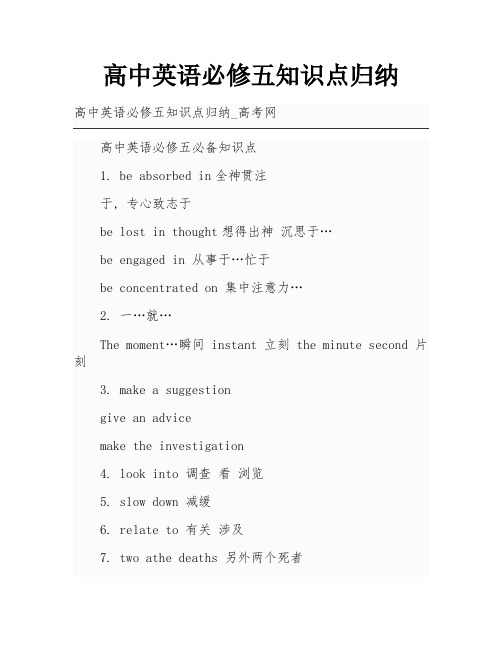
高中英语必修五知识点归纳高中英语必修五必备知识点1. be absorbed in全神贯注于, 专心致志于be lost in thought想得出神沉思于…be engaged in 从事于…忙于be concentrated on 集中注意力…2. 一…就…The moment…瞬间 instant 立刻 the minute second 片刻3. make a suggestiongive an advicemake the investigation4. look into 调查看浏览5. slow down 减缓6. relate to 有关涉及7. two athe deaths 另外两个死者8. link to 有关联系9. die out 灭绝die of 死于 die from死于10. his career came to anend 他的事业结束了11. develop a severe illness染上很严重的疾病12. make a new career 创立新的事业13. apart from 除了…14. two more example=another two另外两个15. make a face 做鬼脸make one’s way to 转向向…出发,朝…走去 make up one’s mind下定决心make friends make the bed make sure确定make room for为..腾空间高中英语必修五语法知识五大基本句型:1.主语+谓语这种句型简称为主谓结构,其谓语一般都是不及物动词,例:Things change.事物是变化的。
Nobody went.没有人去。
--Did you go by sea?你们走的是海路吗?--NO,we flew.不,我们是飞去。
2.主语+连系动词+表语这种句型称为主系表结构,其实连系动词在形式上也是一种谓语动词,但实质上表语成了谓语,例: Mr. Turner is an artist.特纳先生是位画家。
高中英语必修五语法总结
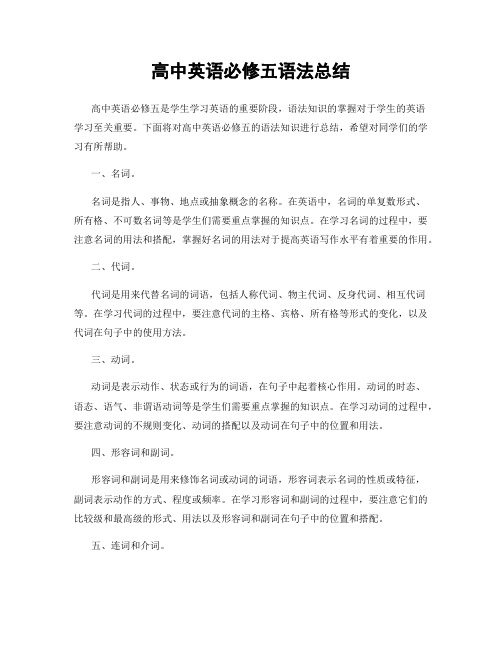
高中英语必修五语法总结高中英语必修五是学生学习英语的重要阶段,语法知识的掌握对于学生的英语学习至关重要。
下面将对高中英语必修五的语法知识进行总结,希望对同学们的学习有所帮助。
一、名词。
名词是指人、事物、地点或抽象概念的名称。
在英语中,名词的单复数形式、所有格、不可数名词等是学生们需要重点掌握的知识点。
在学习名词的过程中,要注意名词的用法和搭配,掌握好名词的用法对于提高英语写作水平有着重要的作用。
二、代词。
代词是用来代替名词的词语,包括人称代词、物主代词、反身代词、相互代词等。
在学习代词的过程中,要注意代词的主格、宾格、所有格等形式的变化,以及代词在句子中的使用方法。
三、动词。
动词是表示动作、状态或行为的词语,在句子中起着核心作用。
动词的时态、语态、语气、非谓语动词等是学生们需要重点掌握的知识点。
在学习动词的过程中,要注意动词的不规则变化、动词的搭配以及动词在句子中的位置和用法。
四、形容词和副词。
形容词和副词是用来修饰名词或动词的词语,形容词表示名词的性质或特征,副词表示动作的方式、程度或频率。
在学习形容词和副词的过程中,要注意它们的比较级和最高级的形式、用法以及形容词和副词在句子中的位置和搭配。
五、连词和介词。
连词是用来连接词语、短语或句子的词语,包括并列连词、从属连词等。
介词是用来表示名词或代词与其他词语之间的关系的词语。
在学习连词和介词的过程中,要注意它们在句子中的连接作用和搭配方法,掌握好连词和介词的用法对于提高句子的连贯性和表达能力有着重要的作用。
六、句子结构。
句子是语言表达的基本单位,句子的结构对于语言的表达和理解有着重要的影响。
在学习句子结构的过程中,要注意句子的主谓宾结构、定语从句、状语从句等句子成分的使用方法和搭配规则,掌握好句子结构对于提高语言表达能力有着重要的作用。
总结,高中英语必修五的语法知识是学生们英语学习的基础,掌握好这些知识对于学生们的英语学习和提高英语水平有着重要的意义。
英语必修五知识点总结
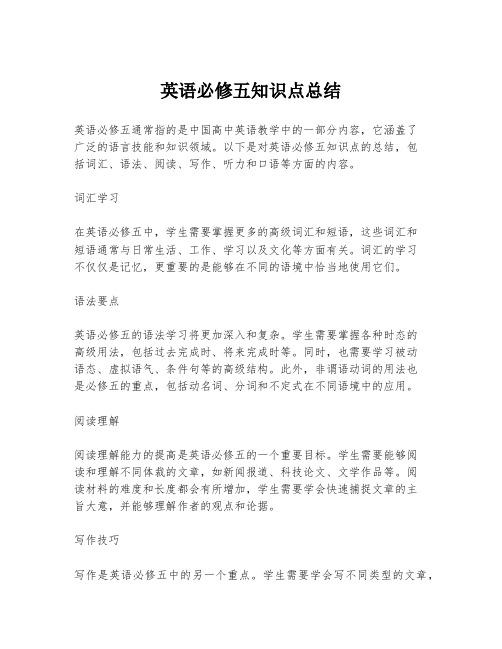
英语必修五知识点总结英语必修五通常指的是中国高中英语教学中的一部分内容,它涵盖了广泛的语言技能和知识领域。
以下是对英语必修五知识点的总结,包括词汇、语法、阅读、写作、听力和口语等方面的内容。
词汇学习在英语必修五中,学生需要掌握更多的高级词汇和短语,这些词汇和短语通常与日常生活、工作、学习以及文化等方面有关。
词汇的学习不仅仅是记忆,更重要的是能够在不同的语境中恰当地使用它们。
语法要点英语必修五的语法学习将更加深入和复杂。
学生需要掌握各种时态的高级用法,包括过去完成时、将来完成时等。
同时,也需要学习被动语态、虚拟语气、条件句等的高级结构。
此外,非谓语动词的用法也是必修五的重点,包括动名词、分词和不定式在不同语境中的应用。
阅读理解阅读理解能力的提高是英语必修五的一个重要目标。
学生需要能够阅读和理解不同体裁的文章,如新闻报道、科技论文、文学作品等。
阅读材料的难度和长度都会有所增加,学生需要学会快速捕捉文章的主旨大意,并能够理解作者的观点和论据。
写作技巧写作是英语必修五中的另一个重点。
学生需要学会写不同类型的文章,包括议论文、说明文、记叙文等。
在写作过程中,学生需要掌握如何组织文章结构,如何使用恰当的连接词,以及如何进行有效的论证。
此外,写作的准确性和流畅性也是评价学生写作能力的重要标准。
听力理解听力理解能力的提高也是英语必修五的一个重要方面。
学生需要能够听懂不同口音和语速的英语,理解不同场合下的对话和演讲。
听力材料可能包括日常对话、新闻广播、学术讲座等。
学生需要学会捕捉关键信息,并能够根据听到的内容进行推理和判断。
口语表达口语表达能力的培养是英语必修五的重要组成部分。
学生需要能够在不同的社交场合中流利地进行交流。
这包括日常对话、讨论问题、表达个人意见等。
学生需要学会如何使用恰当的语调、语速和肢体语言来增强表达的效果。
文化知识除了语言技能的学习,英语必修五还涉及到英语国家的文化知识。
学生需要了解英语国家的传统节日、风俗习惯、历史背景等。
人教版英语高中必修五知识点总结

千里之行,始于足下。
人教版英语高中必修五知识点总结人教版英语高中必修五知识点总结:1. 重点句型和语法结构:- 从句:如定语从句、名词性从句、状语从句等,可以用来丰富句子结构。
- 被动语态:用于强调对象或者不知道主语的情况。
- 情态动词:如can, may, must等,用于表示能力、允许、推测等。
2. 重点词汇:- 名词:如profession, industry, environment等,常用于描述人类社会、经济和环境等问题。
- 动词:如invest, reduce, promote等,用于描述行为、努力和改变等。
- 形容词和副词:如efficient, rapid, dramatically等,用于描述事物的特征、程度和方式等。
3. 阅读技巧:- 理解文章主旨:通过标题、第一段和重点段落等进行快速阅读,抓住文章主旨。
- 掌握文章结构:了解文章开头、中间和结尾的段落结构,对文章内容整体有个把握。
- 注意关键词和线索:通过标点符号、关键词和词组等找出关键信息,帮助理解文章细节。
4. 写作技巧:- 找准写作目标:根据题目要求确定写作目标,如说明原因、提出建议等。
- 合理组织文章结构:包括引言、正文和结论等,确保逻辑清晰、层次分明。
第1页/共2页锲而不舍,金石可镂。
- 使用适当的连词和过渡词:如and, but, however, therefore等,用于连接句子和段落,使句子之间关系更加紧密。
5. 口语表达:- 学会用简洁的语言表达:避免使用冗长的句子和繁琐的词汇,提高口语表达的流利度。
- 锻炼听力和口语技能:通过听英语广播、看英语电影和参加英语角等提高听力和口语水平。
- 多加练习和实践:积极参与英语口语练习和交流,增加口语表达的机会和经验。
英语必修5知识点总结
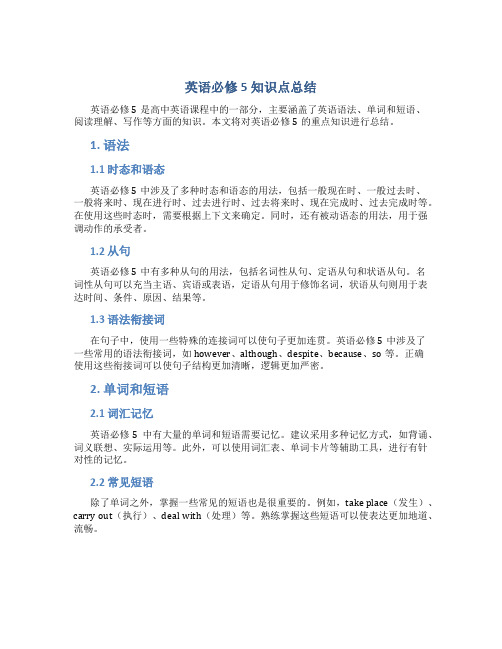
英语必修5知识点总结英语必修5是高中英语课程中的一部分,主要涵盖了英语语法、单词和短语、阅读理解、写作等方面的知识。
本文将对英语必修5的重点知识进行总结。
1. 语法1.1 时态和语态英语必修5中涉及了多种时态和语态的用法,包括一般现在时、一般过去时、一般将来时、现在进行时、过去进行时、过去将来时、现在完成时、过去完成时等。
在使用这些时态时,需要根据上下文来确定。
同时,还有被动语态的用法,用于强调动作的承受者。
1.2 从句英语必修5中有多种从句的用法,包括名词性从句、定语从句和状语从句。
名词性从句可以充当主语、宾语或表语,定语从句用于修饰名词,状语从句则用于表达时间、条件、原因、结果等。
1.3 语法衔接词在句子中,使用一些特殊的连接词可以使句子更加连贯。
英语必修5中涉及了一些常用的语法衔接词,如however、although、despite、because、so等。
正确使用这些衔接词可以使句子结构更加清晰,逻辑更加严密。
2. 单词和短语2.1 词汇记忆英语必修5中有大量的单词和短语需要记忆。
建议采用多种记忆方式,如背诵、词义联想、实际运用等。
此外,可以使用词汇表、单词卡片等辅助工具,进行有针对性的记忆。
2.2 常见短语除了单词之外,掌握一些常见的短语也是很重要的。
例如,take place(发生)、carry out(执行)、deal with(处理)等。
熟练掌握这些短语可以使表达更加地道、流畅。
3. 阅读理解3.1 阅读技巧在阅读理解中,除了要理解文章的字面意思,还需理解文章的隐含意思、推理和总结。
建议先通读全文,了解大意,然后逐段细读,注意关键词,推测词义,归纳出文章的主旨和作者观点。
3.2 阅读题型英语必修5中的阅读理解题型主要包括选择题、判断题、填空题和短文写作等。
针对不同题型,需要采用相应的解题方法,如判断题要搞清楚文章中的具体信息,填空题要根据上下文确定适当的词,短文写作要注意结构和语法的正确运用。
高二年级必修五英语知识点总结(通用10篇)
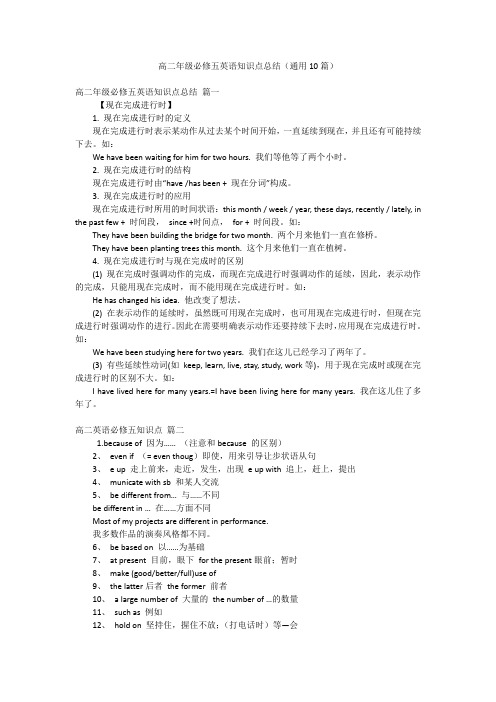
高二年级必修五英语知识点总结(通用10篇)高二年级必修五英语知识点总结篇一【现在完成进行时】1. 现在完成进行时的定义现在完成进行时表示某动作从过去某个时间开始,一直延续到现在,并且还有可能持续下去。
如:We have been waiting for him for two hours. 我们等他等了两个小时。
2. 现在完成进行时的结构现在完成进行时由“have /has been + 现在分词”构成。
3. 现在完成进行时的应用现在完成进行时所用的时间状语:this month / week / year, these days, recently / lately, in the past few + 时间段,since +时间点,for + 时间段。
如:They have been building the bridge for two month. 两个月来他们一直在修桥。
They have been planting trees this month. 这个月来他们一直在植树。
4. 现在完成进行时与现在完成时的区别(1) 现在完成时强调动作的完成,而现在完成进行时强调动作的延续,因此,表示动作的完成,只能用现在完成时,而不能用现在完成进行时。
如:He has changed his idea. 他改变了想法。
(2) 在表示动作的延续时,虽然既可用现在完成时,也可用现在完成进行时,但现在完成进行时强调动作的进行。
因此在需要明确表示动作还要持续下去时,应用现在完成进行时。
如:We have been studying here for two years. 我们在这儿已经学习了两年了。
(3) 有些延续性动词(如keep, learn, live, stay, study, work等),用于现在完成时或现在完成进行时的区别不大。
如:I have lived here for many years.=I have been living here for many years. 我在这儿住了多年了。
高二英语必修五知识点总结精选最新5篇
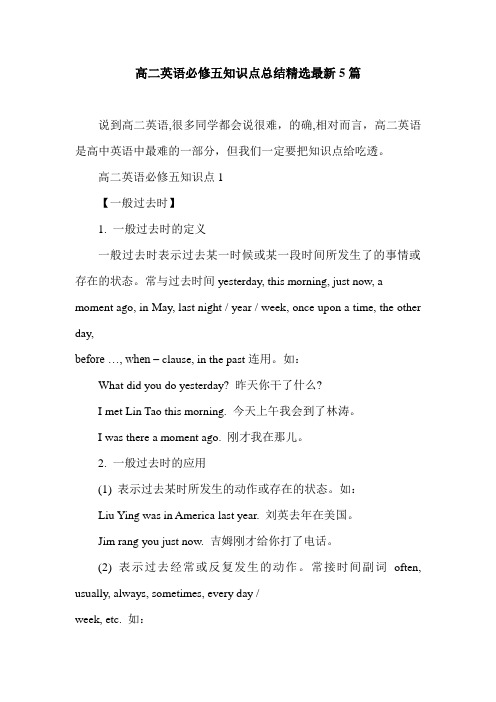
高二英语必修五知识点总结精选最新5篇说到高二英语,很多同学都会说很难,的确,相对而言,高二英语是高中英语中最难的一部分,但我们一定要把知识点给吃透。
高二英语必修五知识点1【一般过去时】1. 一般过去时的定义一般过去时表示过去某一时候或某一段时间所发生了的事情或存在的状态。
常与过去时间yesterday, this morning, just now, a moment ago, in May, last night / year / week, once upon a time, the other day,before …, when – clause, in the past连用。
如:What did you do yesterday? 昨天你干了什么?I met Lin Tao this morning. 今天上午我会到了林涛。
I was there a moment ago. 刚才我在那儿。
2. 一般过去时的应用(1) 表示过去某时所发生的动作或存在的状态。
如:Liu Ying was in America last year. 刘英去年在美国。
Jim rang you just now. 吉姆刚才给你打了电话。
(2) 表示过去经常或反复发生的动作。
常接时间副词often, usually, always, sometimes, every day /week, etc. 如:We often went out for a walk after supper. 我们过去常在晚饭后散步。
We usually played together. 我们通常一起玩。
3. 一般过去时对谓语动词的要求[page]一般过去时的谓语动词要用动词的过去式。
动词过去式的构成分规则变化和不规则变化两种形式,不规则变化通常需要逐个记忆,规则变化则遵循以下原则:(1) 一般在动词后加-ed。
如:play—played, offer—offered, weigh—weighed, destroy—destroyed, sign—signed.(2) 在以字母e结尾的动词后,只加-d。
高中英语必修5知识点总结
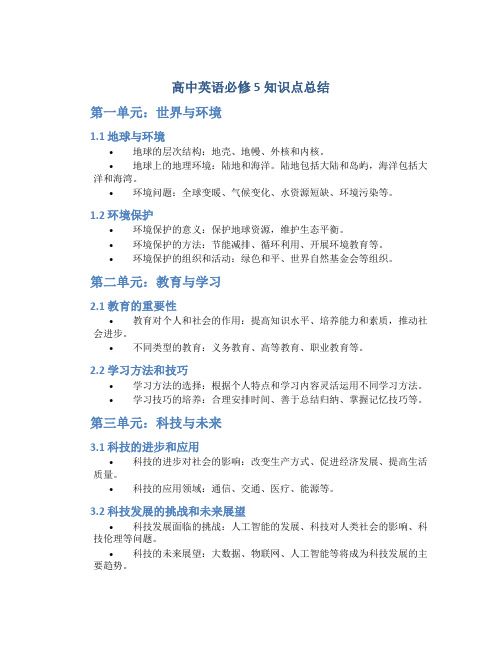
高中英语必修5知识点总结第一单元:世界与环境1.1 地球与环境•地球的层次结构:地壳、地幔、外核和内核。
•地球上的地理环境:陆地和海洋。
陆地包括大陆和岛屿,海洋包括大洋和海湾。
•环境问题:全球变暖、气候变化、水资源短缺、环境污染等。
1.2 环境保护•环境保护的意义:保护地球资源,维护生态平衡。
•环境保护的方法:节能减排、循环利用、开展环境教育等。
•环境保护的组织和活动:绿色和平、世界自然基金会等组织。
第二单元:教育与学习2.1 教育的重要性•教育对个人和社会的作用:提高知识水平、培养能力和素质,推动社会进步。
•不同类型的教育:义务教育、高等教育、职业教育等。
2.2 学习方法和技巧•学习方法的选择:根据个人特点和学习内容灵活运用不同学习方法。
•学习技巧的培养:合理安排时间、善于总结归纳、掌握记忆技巧等。
第三单元:科技与未来3.1 科技的进步和应用•科技的进步对社会的影响:改变生产方式、促进经济发展、提高生活质量。
•科技的应用领域:通信、交通、医疗、能源等。
3.2 科技发展的挑战和未来展望•科技发展面临的挑战:人工智能的发展、科技对人类社会的影响、科技伦理等问题。
•科技的未来展望:大数据、物联网、人工智能等将成为科技发展的主要趋势。
第四单元:文学与艺术4.1 文学的基本要素•文学的含义和特点:文学是人们用语言表达思想感情、描绘社会生活的艺术形式。
•文学的基本要素:主题、情节、人物、语言等。
4.2 艺术的种类和表现形式•艺术的种类:文学艺术、音乐艺术、绘画艺术、舞蹈艺术等。
•艺术的表现形式:写实主义、抽象主义、表现主义等。
第五单元:经济与消费5.1 经济的基本概念和分类•经济的定义:研究人类社会生产和分配活动的学科。
•经济的分类:宏观经济和微观经济。
5.2 消费与消费者权益保护•消费的概念和特点:消费是人们使用货币购买商品和服务的行为。
•消费者权益保护:消费者权益保护法和消费者组织的作用。
以上是高中英语必修5的知识点总结,希望对你的学习有所帮助!。
高一英语必修五内容知识点总结(5篇)
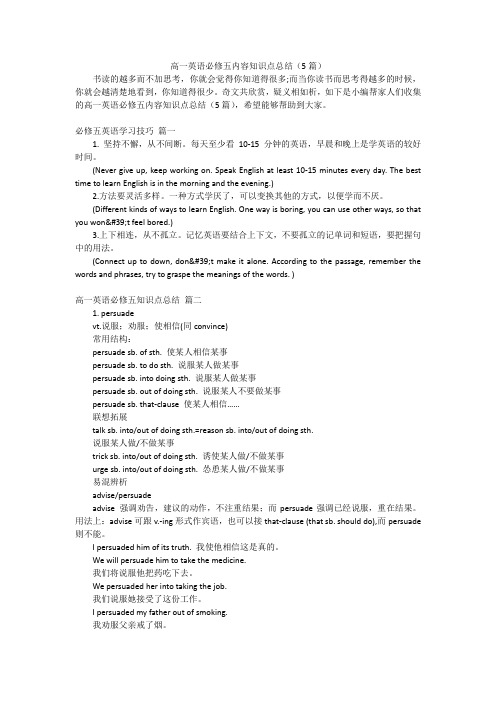
高一英语必修五内容知识点总结(5篇)书读的越多而不加思考,你就会觉得你知道得很多;而当你读书而思考得越多的时候,你就会越清楚地看到,你知道得很少。
奇文共欣赏,疑义相如析,如下是小编帮家人们收集的高一英语必修五内容知识点总结(5篇),希望能够帮助到大家。
必修五英语学习技巧篇一1. 坚持不懈,从不间断。
每天至少看10-15 分钟的英语,早晨和晚上是学英语的较好时间。
(Never give up, keep working on. Speak English at least 10-15 minutes every day. The best time to learn English is in the morning and the evening.)2.方法要灵活多样。
一种方式学厌了,可以变换其他的方式,以便学而不厌。
(Different kinds of ways to learn English. One way is boring, you can use other ways, so that you won't feel bored.)3.上下相连,从不孤立。
记忆英语要结合上下文,不要孤立的记单词和短语,要把握句中的用法。
(Connect up to down, don't make it alone. According to the passage, remember the words and phrases, try to graspe the meanings of the words. )高一英语必修五知识点总结篇二1. persuadevt.说服;劝服;使相信(同convince)常用结构:persuade sb. of sth. 使某人相信某事persuade sb. to do sth. 说服某人做某事persuade sb. into doing sth. 说服某人做某事persuade sb. out of doing sth. 说服某人不要做某事persuade sb. that-clause 使某人相信……联想拓展talk sb. into/out of doing sth.=reason sb. into/out of doing sth.说服某人做/不做某事trick sb. into/out of doing sth. 诱使某人做/不做某事urge sb. into/out of doing sth. 怂恿某人做/不做某事易混辨析advise/persuadeadvise 强调劝告,建议的动作,不注重结果;而persuade强调已经说服,重在结果。
英语必修5知识点总结
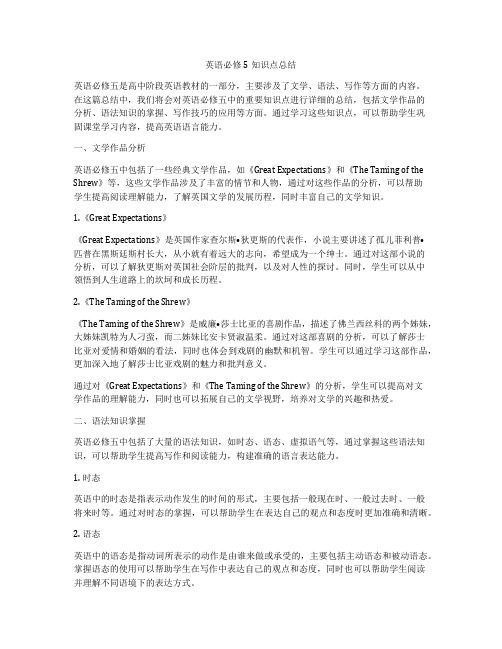
英语必修5知识点总结英语必修五是高中阶段英语教材的一部分,主要涉及了文学、语法、写作等方面的内容。
在这篇总结中,我们将会对英语必修五中的重要知识点进行详细的总结,包括文学作品的分析、语法知识的掌握、写作技巧的应用等方面。
通过学习这些知识点,可以帮助学生巩固课堂学习内容,提高英语语言能力。
一、文学作品分析英语必修五中包括了一些经典文学作品,如《Great Expectations》和《The Taming of the Shrew》等,这些文学作品涉及了丰富的情节和人物,通过对这些作品的分析,可以帮助学生提高阅读理解能力,了解英国文学的发展历程,同时丰富自己的文学知识。
1.《Great Expectations》《Great Expectations》是英国作家查尔斯•狄更斯的代表作,小说主要讲述了孤儿菲利普•匹普在黑斯廷斯村长大,从小就有着远大的志向,希望成为一个绅士。
通过对这部小说的分析,可以了解狄更斯对英国社会阶层的批判,以及对人性的探讨。
同时,学生可以从中领悟到人生道路上的坎坷和成长历程。
2.《The Taming of the Shrew》《The Taming of the Shrew》是威廉•莎士比亚的喜剧作品,描述了佛兰西丝科的两个姊妹,大姊妹凯特为人刁蛮,而二姊妹比安卡贤淑温柔。
通过对这部喜剧的分析,可以了解莎士比亚对爱情和婚姻的看法,同时也体会到戏剧的幽默和机智。
学生可以通过学习这部作品,更加深入地了解莎士比亚戏剧的魅力和批判意义。
通过对《Great Expectations》和《The Taming of the Shrew》的分析,学生可以提高对文学作品的理解能力,同时也可以拓展自己的文学视野,培养对文学的兴趣和热爱。
二、语法知识掌握英语必修五中包括了大量的语法知识,如时态、语态、虚拟语气等,通过掌握这些语法知识,可以帮助学生提高写作和阅读能力,构建准确的语言表达能力。
1. 时态英语中的时态是指表示动作发生的时间的形式,主要包括一般现在时、一般过去时、一般将来时等。
- 1、下载文档前请自行甄别文档内容的完整性,平台不提供额外的编辑、内容补充、找答案等附加服务。
- 2、"仅部分预览"的文档,不可在线预览部分如存在完整性等问题,可反馈申请退款(可完整预览的文档不适用该条件!)。
- 3、如文档侵犯您的权益,请联系客服反馈,我们会尽快为您处理(人工客服工作时间:9:00-18:30)。
高中英语必修五单词及语言点总结单词总结Unit 5 First aid一. 单词拼写(须用本单元的单词和词汇)1. The lung is an o________________and so is the heart.2. He tried to kill himself by taking p_________________.3. He has gone to the hospital for special t__________________.4. I was only m_______________interested in the story I read in the newspaper.5. Her ankle s_____________after the fall.6. Her foot was very s_________________after the accident.7. I can't s______________________toothpaste out of the tube.8. What is the typical s______________________of SARS?9. Would you like me to_________________your shirt for you?10. She is suffring from a lung i___________________.11. He (颁发)a silver cup to the winner.12. Did you attend your uncle's wedding_____________________(仪式)13. He is a_____________________(勇敢的) soldier.14. The _______________(压力)of the water can turn this wheel.15. We have to write an_________________(文章) about the film we saw yesterday.16. You should have your own ____________________ (毛巾).17. Have you worked out your ____________________ (方案)?18. I saw an___________________(救护车) passing by.19. I'm_____________________(自豪)of my son.20. _______________________(祝贺)to you on your success!21. An a________________ is a vehicle for taking people to and from hospital.22. R_______________is energy, often in waves of heat or light that comes from a particular source.23. A b_______________ is a long strip of cloth which is covered around a wounded part of someone's body to protect or support it.24. If there is p________________on someone to do something, someone is trying to persuade them to do it.25. An o______________is a part of your body that has particular purpose or function, for example your heart.26. Fever is a _________________(征兆) of many illnesses.27. The bell rang, the naughty boy ______________(挤) his book into his bag and went out of the classroom.28. The streets in the centre of the city were___________(塞) up with traffic because of an accident.29. The storm did a lot of ______________(毁坏) to the building and crops in Hunan province.30. A bee has stung my hand and it is __________________(膨胀) up.二.短语翻译1.阻止(某人)做……___________________________2.触感________________________________3.挤出;榨出____________________________4。
在适当的位置______________________________5.反复,多次____________________________6.开展,执行___________________________________7.找到___________________________________8.许多,大量______________________________9.自豪_________________________________10.砍掉,砍伐____________________________三。
完成句子1. He suddenly________ _________ __________ _______(昨晚他突然病了).2. Sunglasses can_______ ________ ________ _________ the sun' s rays (保护我们的眼睛免受...... ).3. You may __________ ______________(烫伤) by hot liquids.4. These burns are not serious and they should______ ______ -______ ______________ _______ ___________(一天之内就会好许多)。
5. First degree burns __________ ___________when they are pressed(变成白色).参考答案Unit 5.一。
1. organ 2. poison 3. treatment 4. mildly 5. swelled 6. swollen7. squeeze 8. symptom 9. iron 10. infection 11. presented 12. ceremory13. brave 14. pressure 15. essay 16. towel 17. scheme 18. ambulance19. proud 20. Congratulations 21. ambulance 22. Radiation 23. bandage24. pressure 25. organ 26. symptom 27. squeezed 28. choked 29. damage30. swelling二。
1. prevent sb from doing sth 2. sense of touch 3. squeeze out 4. in place5. over and over again6. carry out7. put one’s hands on8. a number of9. be proud of 10. cut off三。
1. fell ill last night 2. protect our eyes from 3. get burnt4. feel better within a day or two5. turn whiteUnit 1 Great ScientistsWord usage1. attend v 1)to take care; give attention2) to be present at3) to take care of ; take part in; pay attention to sth; look afterHe did not attend the meeting yesterday.The school was attended almost entirely by local childrenThere was no one to attend him but Tina.She didn't attend to what I was saying.2. expose v 1) to make visible to2) to reveal the guilt or wrong doing ofThey consider it almost a crime to expose children to violence and sex on TV. Their scheme was exposed.Don't expose the film to light.Cleaning exposed the grain of wood.3. cure v. 1)bring a person back to healthn 2) curing and being curedAntibiotics help to cure many diseases that were formerly fatal.Penicillin cured him of pneumonia.You cured me completely.There's no known cure for a cold.She tried every means to cure her child of the bad habit4. absorb v :1) to occupy the full attention, or time2) take and suck in, take in heat and light etc.Cotton gloves absorb sweat.So many good ideas! It's too much for me to absorb all at once.The old man was utterly absorbed in the book.Small businesses are absorbed by big ones.She won't be able to absorb another heavy blow.5. contribute v 1) join with others in giving help, money etc.2) have a share inHe contributed half of his savings to the relief fund.He didn't contribute one idea to the documentHe contributed generously to the Red Cross.He never contributes to the discussionThe scientist often contributes to an academic journal6. control v. to exercise authoritative or dominating influence over; direct n. to hold in restraint; checkShe is skillful enough to control the machine now.The British government at that time controlled the islandYou must learn to control your temper.They have no control over him.The helicopter landed with Joe at the controls.7. determine v. to reach a decision; resolveShe determined to go that very afternoonMy mom's encouragement determined me to go on with my studyHe was determined to win the gameThe court determined that the man was guilty of drunken driving.They have determined where the new school will be built.8. devote v. to give or apply entirely to particular activity, cause or a person He devoted himself to writing.He was still devoted to the study of chemistryHe has devoted his whole life to benefiting mankind.9. confuse v. 1) to cause to be unable to think clarity or act with intelligence2) to assemble without order or sense; jumbleThey confused me by their conflicting adviceYou confused Australia with Austria.His granddaughter confused the papers on his desk.10. enthusiastic adj. Having or demonstrating enthusiasmDavid is very enthusiastic about the plan.They are enthusiastic admirers of that movie star.My parents are enthusiastic skiers.11. valuable adj. 1) worth of a lot of money2) having great usefulness or valueHe bought me a valuable diamond ring as a birthday presentThis experience is valuable to me.12. especially adv. 1) to extend or degree deserving of special emphasis2) particularly, in particularI liked all the children, Tom especially.We need to be especially careful.The book is compiled especially for beginners.13. conclude v. 1) to bring to an end; close2) to arrive at but the process of reasonWe concluded our meeting at 9 o'clock.What can you conclude from these observations?He concluded that he would wait a little longer.The meeting concluded after two hours.14. replace v. 1) to put back into a former position or place2) to take or fill the place ofShe replaced the receiver.The brakes have to be replaced.Electric lights have replaced candles.I will replace the cup I broke.15. puzzle n. 1) something that baffles or confuses2) something, suc h as a toy or game, that tests one’s ingenuityv. 3) to baffle or confuse mentallyWhat puzzles me is why they didn't show up.He looked a little puzzled.His recent behavior puzzles me.Her decision was a puzzle to him.16. admire v. to regard with pleasure, wonder, and approvalWe admire her for her diplomatic tact.He admires your poems very much.He admired her new hat.17. appear vi. 1) to become visible2) to seem or look to be3) to come before the publicGradually a smile appeared on her face.It appears they are right.He appeared to be talking to himself.The famous singer is appearing this fall at the Music Festival.Useful expressions1. put forward to offer( an idea, suggestion etc.) for considerationHe put forward a very good suggestion at the meeting.You ought to put your watch forward ten minutes.2. believe in 1) to accept as true or real2) to have a firm religious faith3) to have faith or trust inChristians believe in Jesus.We believe in him.Jim believes in fresh air and morning exercises.3. in addition adv. As well asThey eat a great deal of fruit in addition.In addition, the course also produces practical experience.4. deal with: do with, concern sthHe has learnt to deal properly with all kinds of complicated situations.This book deals with an important issue.I don’t know what they do with the problem=I don’t know how they deal with the problem5. make sense 1) to make sth understand or reasonable2) to have a clear meaning3) to be a wise course of actionThis sentence doesn't make sense.Your story doesn’t make sense to meHere, read the sentence. It doesn’t seem to make sense.6. base on: to use particular information or facts as a point from which todevelop an idea, plan, etc.This play is based on a true story.We should base our theory on facts.7. apart from: without considering; except forHe lives apart from his family.Apart from a few faults, he is a trustworthy teacher.Apart from the the cost, the dress doesn’t suit me.8. look into : to investigateWe will look into this matter together.9. join in 1) to participate with in an act or activity2) to become a part or member of3) to put sth togetherWill you join me in a walk?He jion the army.Where does the path join the road?Tie a knot to join those two piece of rope.10. go over 1) go examine2) to look at or examine for a purpose3) to repeatWe went over the building.We must go over the account s carefully before we settle down.GO over the lesson again。
